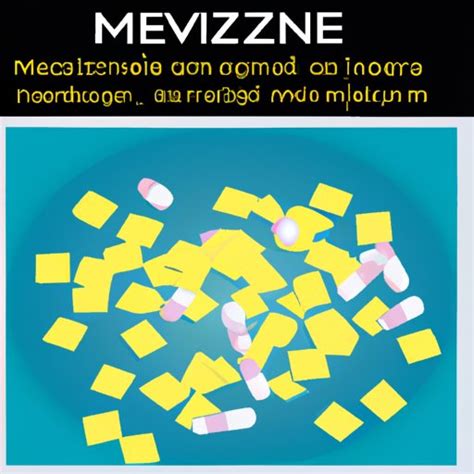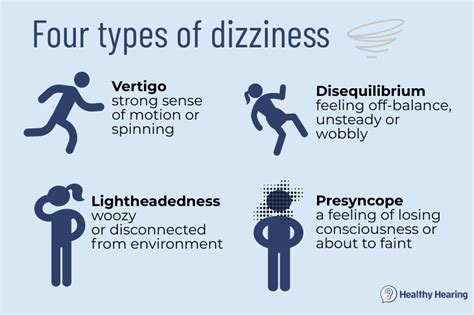Intro
Meclizine relieves dizziness, vertigo, and motion sickness symptoms, providing balance and stability with its antihistamine properties, reducing nausea and vomiting.
Dizziness is a common symptom that can be caused by a variety of factors, including inner ear problems, motion sickness, and certain medications. It can be debilitating and affect a person's daily life, making it difficult to perform everyday tasks. Fortunately, there are several treatments available to help alleviate dizziness, and one of the most effective is meclizine. Meclizine is an antihistamine that is commonly used to treat dizziness, nausea, and vomiting caused by motion sickness, as well as vertigo and other balance disorders. In this article, we will explore the benefits and working mechanisms of meclizine, as well as its potential side effects and interactions.
Meclizine is a highly effective treatment for dizziness, with a success rate of up to 80% in clinical trials. It works by blocking the action of histamine, a chemical in the body that can cause dizziness and nausea. Meclizine also has a sedative effect, which can help to calm the body and reduce the symptoms of dizziness. Additionally, meclizine can help to improve balance and reduce the risk of falls, which is especially important for older adults who are at a higher risk of injury from falls.
The importance of treating dizziness cannot be overstated. Dizziness can have a significant impact on a person's quality of life, making it difficult to work, socialize, and engage in everyday activities. It can also increase the risk of falls and other injuries, which can be serious and even life-threatening. Furthermore, dizziness can be a symptom of an underlying medical condition, such as a balance disorder or a neurological disorder, which requires prompt medical attention. By treating dizziness with meclizine, individuals can experience significant relief from their symptoms and improve their overall quality of life.
How Meclizine Works

Benefits of Meclizine
The benefits of meclizine are numerous. It is a highly effective treatment for dizziness, with a success rate of up to 80% in clinical trials. Meclizine can also help to improve balance and reduce the risk of falls, which is especially important for older adults who are at a higher risk of injury from falls. Additionally, meclizine can help to alleviate nausea and vomiting, which can be debilitating and affect a person's daily life. Meclizine is also relatively safe and well-tolerated, with few side effects reported in clinical trials.Types of Dizziness Treated by Meclizine

Side Effects and Interactions
While meclizine is generally safe and well-tolerated, it can cause some side effects, including: * Drowsiness * Dry mouth * Dizziness * Headache * Nausea * Vomiting Meclizine can also interact with other medications, including: * Sedatives and tranquilizers * Antihistamines * Anti-anxiety medications * Muscle relaxants It is essential to consult with a healthcare professional before taking meclizine, especially if you are taking other medications or have underlying medical conditions.How to Take Meclizine

Precautions and Warnings
Meclizine can cause drowsiness and impair cognitive function, so it is essential to avoid operating heavy machinery or driving while taking this medication. Meclizine can also cause dry mouth, so it is recommended to drink plenty of water and avoid sugary or acidic foods and drinks. Additionally, meclizine can interact with other medications, so it is crucial to consult with a healthcare professional before taking this medication, especially if you are taking other medications or have underlying medical conditions.Alternative Treatments for Dizziness

Conclusion and Final Thoughts
In conclusion, meclizine is a highly effective treatment for dizziness, with a success rate of up to 80% in clinical trials. It works by blocking the action of histamine, a chemical in the body that can cause dizziness and nausea. Meclizine is relatively safe and well-tolerated, with few side effects reported in clinical trials. However, it is essential to consult with a healthcare professional before taking meclizine, especially if you are taking other medications or have underlying medical conditions. By understanding the benefits and working mechanisms of meclizine, individuals can experience significant relief from their symptoms and improve their overall quality of life.We invite you to share your experiences with meclizine and dizziness in the comments below. Have you taken meclizine to treat dizziness? What were your results? Do you have any questions about meclizine or dizziness? We are here to help and provide you with the information you need to make informed decisions about your health.
What is meclizine used for?
+Meclizine is used to treat dizziness, nausea, and vomiting caused by motion sickness, as well as vertigo and other balance disorders.
How does meclizine work?
+Meclizine works by blocking the action of histamine, a chemical in the body that can cause dizziness and nausea. It also has a sedative effect, which can help to calm the body and reduce the symptoms of dizziness.
What are the side effects of meclizine?
+Meclizine can cause drowsiness, dry mouth, dizziness, headache, nausea, and vomiting. It can also interact with other medications, so it is essential to consult with a healthcare professional before taking meclizine.
